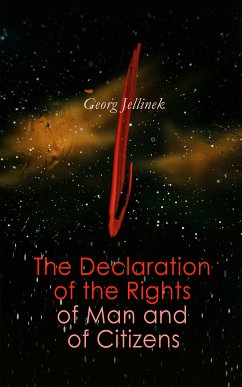Georg Jellinek argues in his essay The Declaration of the Rights of Man and the Citizen for a universal theory of rights, as opposed to the culturally and nationally specific arguments then in vogue. Jellinek indicates that the French Revolution, which was the focal point of 19th-century political theory, should not be thought of as arising from a purely French tradition (namely the tradition stemming from Jean-Jacques Rousseau) but as a close analogue of revolutionary movements and ideas in England and the United States.
Dieser Download kann aus rechtlichen Gründen nur mit Rechnungsadresse in A, B, BG, CY, CZ, D, DK, EW, FIN, F, GR, H, IRL, I, LT, L, LR, M, NL, PL, P, R, S, SLO, SK ausgeliefert werden.









